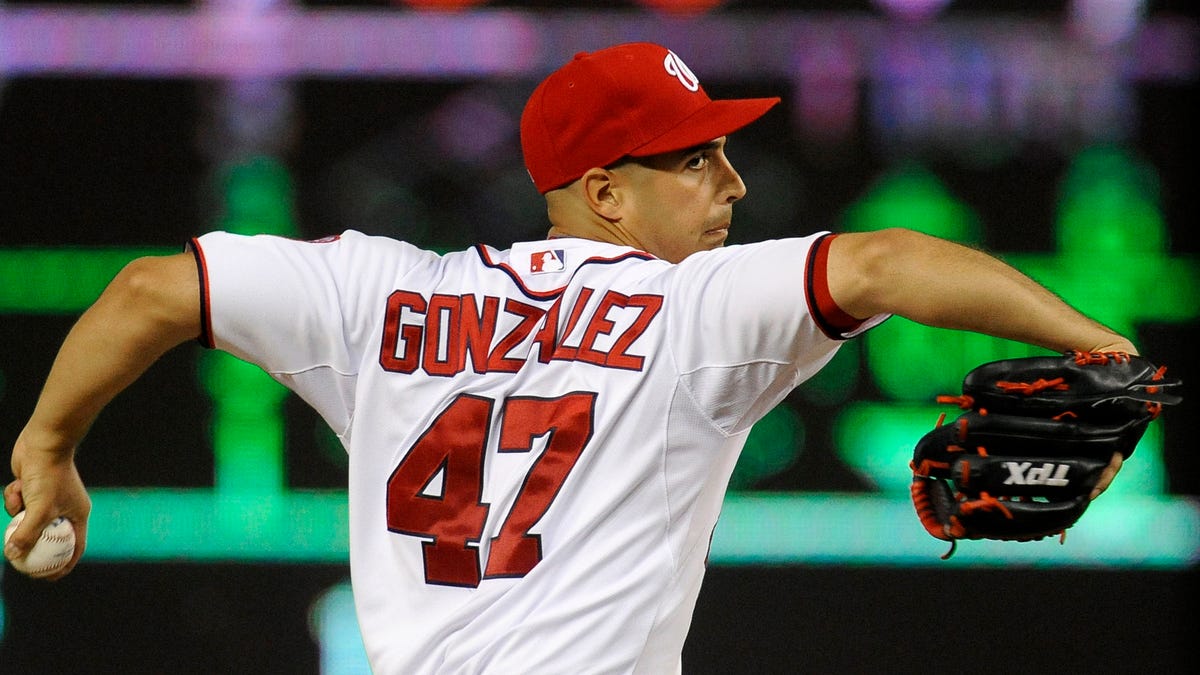
Washington Nationals' starting pitcher Gio Gonzalez delivers in the seventh inning to the Chicago Cubs during their baseball game at Nationals Park, Wednesday, Sept. 5, 2012, in Washington. The Nationals defeated the Cubs 9-1 and Gonzalez won his 18th game of the season. (AP Photo/Richard Lipski)
The fallout from the Biogenesis of America story that has rocked Major League Baseball – as much as Major League Baseball can still be rocked when it comes to performance-enhancing drug news – has dominated the headlines.
Splashed across news and website fronts, the headlines read something like this: A-Rod. Suspensions. A-Rod. Biogenesis. A-Rod. Scandal. A-Rod.
With the MLB Players Association’s formally appealing Yankees third baseman Alex Rodriguez’s 211-game suspension on Wednesday, there are no signs of the story slowing down anytime soon.
Of course, the Biogenesis story isn’t just about one player. After all, 13 players were suspended by the league on Monday for violating its banned substance policy. Twelve of the players have accepted the punishment. Rodriguez received a longer suspension due to what the league deemed “engaging in a course of conduct intended to obstruct and frustrate” its investigation.
This piece isn’t about Rodriguez. Nor is it about the other dozen suspended players. This is a piece about Washington Nationals pitcher Gio Gonzalez. It’s a piece about getting caught in the crosshairs.
In the league office’s announcement of the suspensions on Monday, it issued a release that began, “Major League Baseball issued the following discipline today for violations of the Joint Drug Prevention and Treatment Program in relation to the Biogenesis investigation.”
Buried in the very final paragraph – 253 words and 15 player names later – was a single paragraph that read:
Major League Baseball's investigation found no violations of the Joint Drug Prevention and Treatment Program by either Washington Nationals pitcher Gio Gonzalez or Baltimore Orioles infielder Danny Valencia.
In the world of news writing, the long-held inverted pyramid standard holds that a story should contain information in descending order of importance with the most important information highest (where people are most likely to read) and the least important information at the end (because many people won’t bother to read that far).
When it comes to the latest chapter in MLB’s PED history, being cleared of career—and character—tainting accusations seems far from insignificant. To Gonzalez and Valencia, this news is certainly deserving of more than a minor paragraph tacked on to the end.
When the Miami New Times broke the story in January, Gonzalez was among the most prominent names being listed with Biogenesis ties. He wasn’t Alex Rodriguez caliber, but his Gonzalez’s name was far from unrecognizable.
Gonzalez declared his innocence. But in the current era, such assertions are generally met with an eye roll and a condescending, “Yeah, yeah. We know.” Recent history has shown us that athletes will go to great lengths to deny and/or cover up PED use. (Remember Melky Cabrera and his fake website?)
From the beginning it was clear that Gonzalez’s father, Max, did have connections to the clinic. He happened to live in the Coral Gables area where the clinic was located and was an actual patient for its weight-loss treatment that served as the legitimate arm of the business that was also operating as a PED distributor. Gio Gonzalez never argued this fact.
Days after the Biogenesis story broke, Gonzalez was drug tested by the league. He reported his negative tests to the media. It was picked up at the local level, but received nowhere near the attention of the national news surrounding the story when it broke. Other reports also indicated that Gonzalez had never dealt with Biogenesis, but again these stories were mere follow-ups to the headline-grabbing story.
And now, once again, Gonzalez’s vindication has been overshadowed in the news as well. It’s a secondary story to the ongoing Rodriguez saga.
After all, headlines blaring allegations and denials surrounding superstars are flashier. A player who doesn’t happen to possess the biggest contract in baseball being cleared of wrongdoing after months of having his name dragged into a mess where it will forever be linked to one of the game’s biggest PED scandals isn’t going to garner as much attention.
That’s almost as sad an indictment on the state of sports fandom as the PED era is to the history of baseball.
